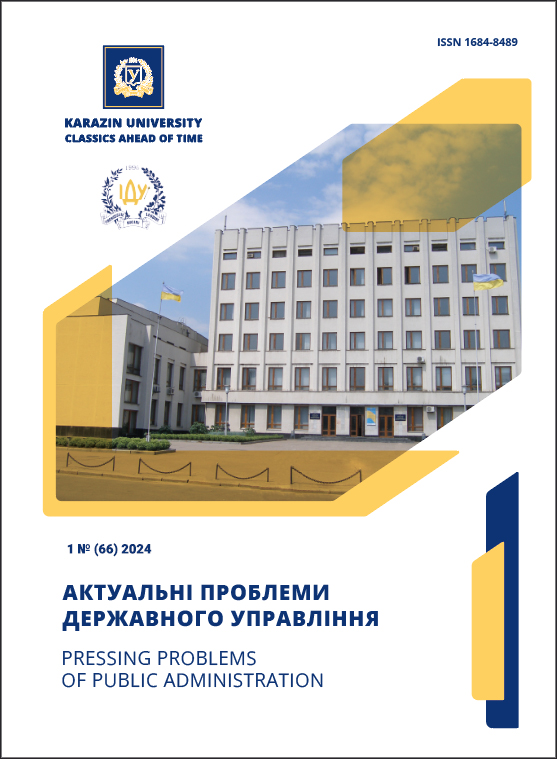Media education in the system of professional development of civil servants and local government officials
Abstract
The article is devoted to the issue of media education in the system of professional development of civil servants and local government officials. In the context of rapid development of the information society and globalization, public officials face daily streams of information that may contain fake news and disinformation. A low level of media literacy leads to the risk of making erroneous decisions and undermining public trust in state institutions. The core issue lies in the lack of a systematic approach to integrating media literacy as an essential professional competency within professional development programs. An analysis of recent studies, particularly the Ukrainian Media Literacy Index 2020–2024, indicates a growing level of media literacy among the population. Ukrainian scholars (Harmatii, Pronevych, Kirdany, Sliusarenko) emphasize the relevance of media education for public officials. The purpose of the article is to define the role of media literacy within professional development systems and to develop recommendations for its integration. The main content reveals that information consumption shapes worldview and public opinion, drawing on sociological theories of Durkheim, Lippmann, Habermas, Berger, and Luckmann. In the era of social media dominance, individual responsibility for information dissemination increases, and media literacy becomes a vital component of professional ethics and information security for public officials. Definitions of media literacy provided by leading researchers converge on the understanding of media literacy as a set of skills for analyzing and evaluating media content. The Law of Ukraine “On Media” and the General Rules of Ethical Conduct for Civil Servants highlight the connection between media literacy and ethical norms of public service. The research confirms that media education is a necessary condition for the development of public officials’ competencies. Within higher education and the National Agency of Ukraine on Civil Service (NAUCS) professional development programs, there is a positive trend toward integrating media education, cybersecurity, information security, and the fundamentals of artificial intelligence, as evidenced by the increase in allocated study hours. The conclusions emphasize that the transformation of the media landscape increases personal responsibility, and media literacy is a critically important professional and ethical competency. Promising directions for further research include: evaluating the effectiveness of current programs, developing differentiated curricula, exploring the impact of AI (including combating deepfakes and disinformation), analyzing international experience, fostering a culture of media literacy at the institutional level, and examining models of interaction with civil society. These areas will contribute to a deeper understanding of the issue and the development of practical recommendations for the systemic and effective implementation of media literacy.
Downloads
References
Volosheniuk, O.V. (2012). Media education and media literacy (V.F. Ivanov &
O.V. Volosheniuk, Eds.; V.V. Rizun, Sci. Ed.). Center for Free Press. URL: https://www.aup.com.ua/uploads/momg.pdf [in Ukrainian].
Habermas, J. (2000). Structural transformations in the public sphere. Research of the category civil society. Litopys. [in Ukrainian].
Harmatii, O.V. (2015). Ukrainskoi Akademii Drukarstva. Seriia: Sotsialni Komunikatsii, (1), 7–14. URL: http://nbuv.gov.ua/UJRN/Nzck_2015_1_3 [in Ukrainian].
Media literacy index of Ukrainians: 2020–2024: fifth wave: analytical report based on the results of a comprehensive study. (2024). Detector Media. URL: https://surl.lu/nqhanp [in Ukrainian].
Kirdan, O., & Kirdan, O. (2023). Development of media education in the late XX – early XXI century as a problem of pedagogical theory and practice: domestic and foreign experience. Osvita. Innovatyka. Praktyka, 11(10), 25–29. URL: https://www.oip-journal.org/index.php/oip/article/view/283/194 [in Ukrainian].
Media literacy of public servants. General professional (certificate) program. Approved by NACS - order of NACS dated July 04, 2023 No. 93-23. (2023). URL: https://pdp.nacs.gov.ua/courses/mediahramotnist-publichnykh-sluzhbovtsiv-14 [in Ukrainian].
On approval of the General rules of ethical conduct of civil servants and local self-government officials. Order No. 158. URL: https://zakon.rada.gov.ua/laws/show/z1203-16#Text [in Ukrainian].
On media: Law of Ukraine No. 2849-IX dated December 13, 2022. (2022). URL: https://zakon.rada.gov.ua/laws/show/2849-20#Text [in Ukrainian].
Pronevych, O. (2024). Conceptual and legal imperatives of increasing media literacy of civil servants. Zbirnyk materialiv IV Mizhnarodnoi naukovo-praktychnoi onlain-konferentsii, 23 travnia 2024 roku, 79–85. URL: https://surl.lt/iwbovx [in Ukrainian].
Sliusarenko, N.V. (2024). Media education in Ukraine: realities and prospects. Pedahohichnyi Almanakh, (55), 26–33. URL: https://pedalmanac.site/index.php/main/article/view/533/425 [in Ukrainian].
Standard of higher education of Ukraine. Specialty 281 “Public management and administration”. Master. URL: https://surl.li/jffztd [in Ukrainian].
Typical general professional (certificate) program for advanced training of heads of local state administrations, their first deputies and deputies. Order No. 68-25. URL: https://surl.lu/wnbxdg [in Ukrainian].
Typical general professional (certificate) program for advanced training of local self-government officials appointed to positions in local self-government bodies. Order No. 42-25. URL: https://surl.li/hxurnm [in Ukrainian].
Scheibe, C., & Rogow, F. (2017). Media literacy: A teacher’s guide (S. Dioma, Trans.;
V.F. Ivanov & O.V. Volosheniuk, Eds.). Center for Free Press, Academy of Ukrainian Press [in Ukrainian].
Berger, P.L., & Luckmann, T. (1966). The social construction of reality: A treatise in the sociology of knowledge. Doubleday.
Durkheim, E. (1997). The division of labor in society (W.D. Halls, Trans.; L.A. Coser, Intro.). Free Press. URL: https://archive.org/details/in.ernet.dli.2015.126617
Lippmann, W. (1949). Public opinion. The Free Press. URL: https://surli.cc/gisgcv
Copyright (c) 2025 Pressing Problems of Public Administration

This work is licensed under a Creative Commons Attribution 4.0 International License.

